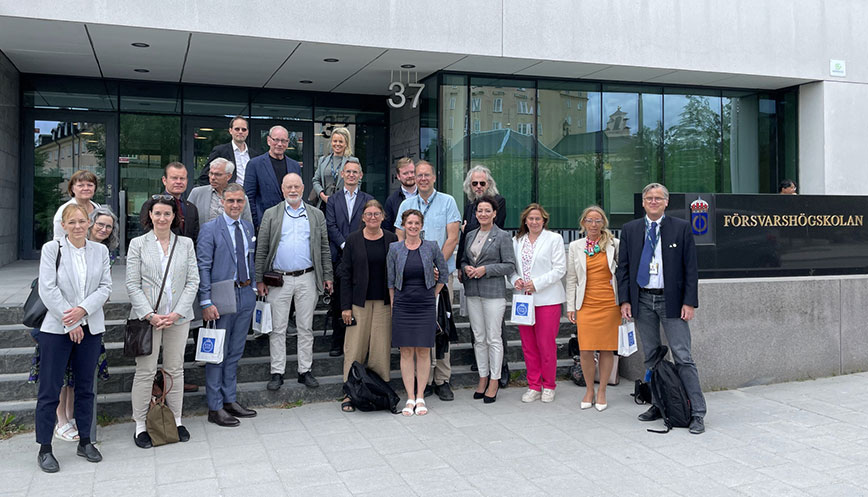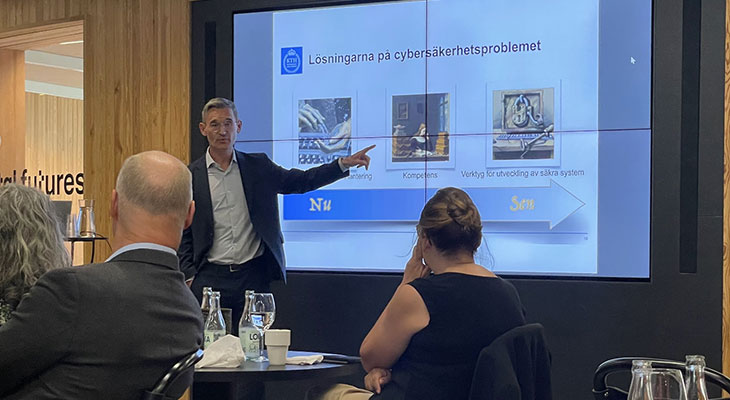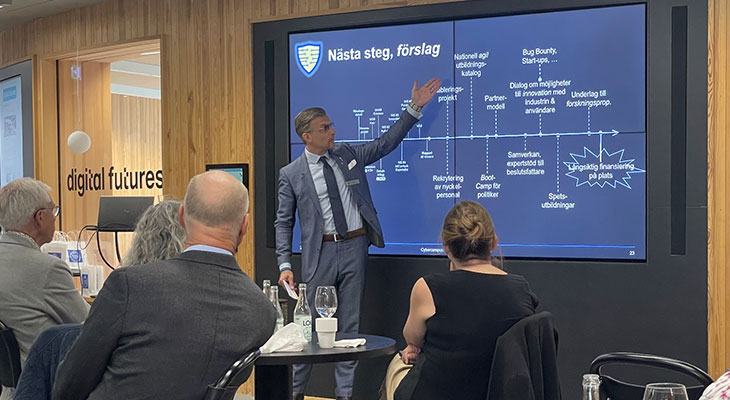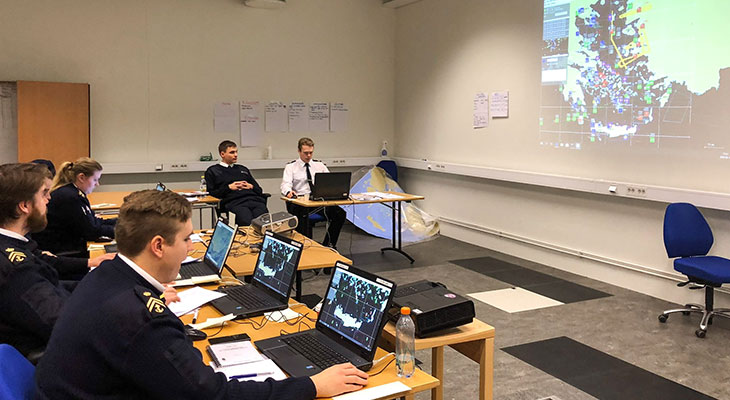Swedish parliament members visit KTH and the Swedish Defence University to learn about cybersecurity

At the beginning of the summer of 2023, the Society of Members of Parliament and Researchers, (Rifo), made a joint study visit to KTH Royal Institute of Technology and the Swedish Defence University. The aim of the visit was to gain a deeper understanding of cybersecurity and learn about current investments in research and training in the field.
“It was such fun and so interesting to visit KTH and the Swedish Defence University to improve our knowledge of a highly topical field. Cybersecurity is discussed in many committees and meetings in the Swedish parliament,” said Gunilla Svantorp, Rifo Chairman and Swedish Social Democratic Party MP.
“Rifo seeks to build bridges between politics and research, so it’s fantastic to have this opportunity to invite KTH and the Swedish Defence University to contribute to these efforts,” said Lina Bertling Tjernberg, Deputy Chairman Rifo, KTH professor and initiator of the meeting.
The MPs were welcomed by Stefan Östlund, Vice President Global Relations KTH, together with Malena Britz, Pro Vice-Chancellor Swedish Defence University.
Östlund gave details about KTH’s work to strengthen the university’s cybersecurity as part of a raft of efforts to improve security in a turbulent environment. He emphasised the importance of building a culture where all employees think about their decisions on a daily basis, including everything from new research collaborations to purchases and participation in international conferences.
Challenges posed by complex IT systems
Pontus Johnson, professor of Networks and Systems Engineering and Director of the Centre for Cyber Defence and Information Security (CDIS), then provided insights into the challenges created by today’s increasingly complex IT systems.
“The way forward is only through better software tools. And the only way to create them is through more research and innovation. At the same time, we’re also facing an acute skills shortage in cybersecurity,” Johnson explained.
He highlighted the findings of the Cybersecurity Workforce Study, which suggests that there is currently a shortage of more than three million people in cybersecurity, which can be compared to the approximately 4.7 million people who already work in the field.

Greater investment in training is needed to address the skills shortage. More places on courses are required, as well as improvements in lifelong learning. Professionals must renew their skills to keep pace with the latest developments.
Johnson said the greatest need for skills is in municipalities and regional authorities, which cannot compete with the higher salaries offered in the private sector.
“Awareness of the need for improved cybersecurity is growing among the country’s municipalities. But it’s yet another priority that competes for limited resources, and the trade-off between healthcare and cybersecurity, for example, is a tough one.”
Johnson also spoke about CDIS, which was started in collaboration with the Swedish Defence University in 2020. Within the framework of CDIS, KTH supports the training of the Swedish Defence Forces’ cyber soldiers and officer training. More than 50 people are involved in research and training in everything from post-quantum cryptography to developing mathematical calculation methods to identify vulnerabilities.
CDIS is one of the initiators of Cybercampus Sweden , which was presented by David Olgart, Development Manager for Cyber Defence for the Swedish Armed Forces and Deputy Director of CDIS. The initiative was launched around 18 months ago with the aim of creating a national effort around cybersecurity.
Cybercampus and national coordination
Cybercampus will complement today’s national security agencies, such as the National Cyber Security Centre , Cybernode and the Swedish National Co-ordination Centre for Cyber Security Research and Innovation .
“At Cybercampus Sweden, we’ll conduct ground-breaking research, innovation and training in cybersecurity and cyber defence beyond what is possible for individual universities, institutes, companies or authorities,” Olgart said.

Since 2023, Cybercampus has received funding from Vinnova and has already held several national workshops and symposiums.
“Cybersecurity research has surged in recent years, and excellent opportunities exist for interdisciplinary collaborations between different universities - collaborations that can be made less complicated by the Cybercampus.”
Olgart gave examples of existing collaborations, including the Swedish IT Security Network for PhD Students, SWITS , and the new SIGS-CyberSec graduate school initiative .
SIGS-CyberSec was presented by Simone Fischer-Hübner, professor at Karlstad University, and consists of a consortium of computer science and information systems researchers from four Swedish universities. The aim of the initiative is to develop industrial competence and expertise in the field and strengthen the cybersecurity profiles of the participating universities.
Uppsala University is also making significant investments in cybersecurity research with the support of the Swedish Foundation for Strategic Research (SSF), the Swedish Research Council, Vinnova and WASP.
All initiatives would benefit from stronger national coordination, like that provided by Cybercampus Sweden, Olgart argued.
When it came to training, Gunnar Karlsson, professor in Telecommunication Systems, spoke about a proposed training package for Cybercampus. The proposal lays a foundation for a flexible approach to training to enable existing professionals to fill skills gaps in the field.
“Cybercampus will be key to gathering and scaling up training in cybersecurity that today’s universities fail to provide,” Karlsson said.
Finally, Patrik Lidhäll, KTH’s IT Security Director, gave an overview of the university’s work on cybersecurity and other types of security.
Visit to the Swedish Defence University
Then, it was time for a study visit to the Swedish Defence University, during which Erik Biverot, Senior Course Co-ordinator, spoke about the university’s courses in security protection.
The Centre for Societal Security (CTSS) provides training in a variety of security protection topics. The need for security protection training has increased considerably due to the new Security Protection Act that came into force in 2019.
“We’ve made safety protection a profession and provide training based on the principle of lifelong learning. There’s a pressing need to improve today’s level of knowledge,” Biverot said.
CTSS is based at the Swedish Defence University and conducts courses in collaboration with the Swedish Security Service and the Swedish Military Intelligence and Security Service (MUST). The university also organises the Cyber Challenge competition , which is intended to increase understanding of cyber attacks and related methods and challenges. The competition is held every autumn with students from all over the country analysing a fictitious scenario based on changed security policy scenarios in the region.
The competition includes risk and incident management, strategic communication, policy development and impact analysis. The top three teams are invited to participate in the international Cyber 9/12 Strategy Challenge .
At the end of the day, the MPs had the opportunity to participate in a live war game in which students practised planning, conducting and evaluating military operations in the immediate environment.

The war game was based on a platform developed in-house at the university and is used as a building block in training to give students experience of working in coordination between different defence forces.
If you would like to know more about the war games run by the Swedish Defence University, check out the university’s Facebook page , where it has published images from previous war games.
Text: Magnus Trogen Pahlén

